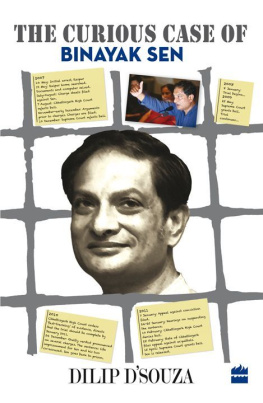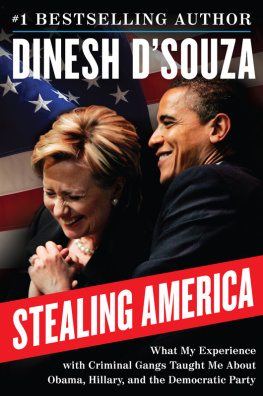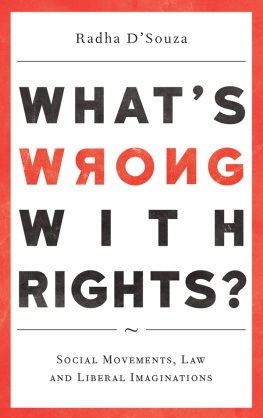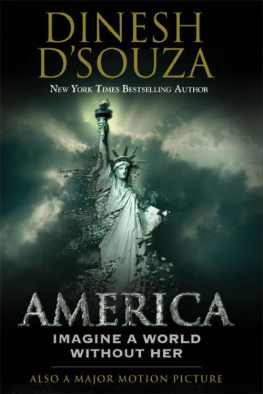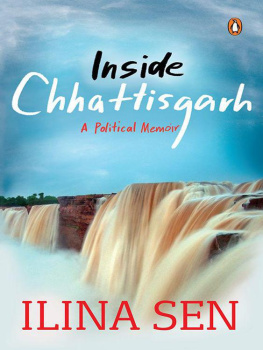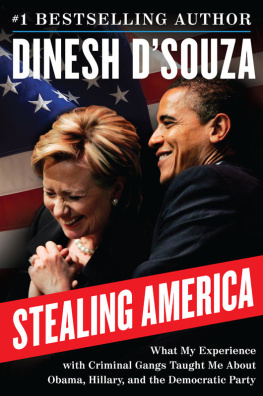THE CURIOUS CASE
OF
BINAYAK SEN
DILIP DSOUZA

HarperCollins Publishers India
For V, who believes in me, and for R&R, who inspire me
Contents

H ow do you begin to understand a man like Binayak Sen? This is no nave question. Consider that Sen is a doctor. Consider what that means.
Even today, the medical profession remains an attractive career option to thousands of hopeful young Indians. It brings both money and respect. If you think of the doctors you know, who have treated you over the years, you will understand what I am saying. Its likely you remember them as men and women of character and intellect, of some standing in the community, certainly among their peers. Doctors do well for themselves, financially and otherwise, in our cities and elsewhere.
How then do you comprehend Sen? He chose a path different from those that other doctors tread, giving up the financial gains and urban comforts that most of them enjoy. Instead, Sen lived and worked in rural India, among some of the worlds most neglected people. He treated them for a range of diseases, from elephantiasis to filariasis. He built a reputation for himself, not among people who might write and talk about him, but among those who have limited access to doctors and medicine.
This is not to paint some glowing picture of heroism in action. Thats not a pursuit that interests me. Having met him, I know it doesnt interest Sen either. But I do admire Sen for reaching a place few of us find in our lives: he makes a living doing what he wants, on his own terms, and as it turns out, its what he was trained to do.
How many of us can say the same about ourselves? This is why it is worth making an effort to understand Sen.
For me, it was less of an effort than I might have imagined. I know a doctor couple who have spent over two decades in work and circumstances similar to Sens. Watching them closely in that time has given me a perspective on and an appreciation for what drives them.
Its not money. They dont live frugally, but by no means are they extravagant in their tastes either. And they continue to do what they have done all these years, what they were trained to do: preventive health care.
What then motivates this couple? I think theres a simple answer: they just wanted to work with Indias poorest. They wanted to make a difference. They relish the challenge of preventive, as opposed to curative, health care. They crave the job satisfaction that comes from doing something thats called meaningful. They believe the medical profession is noble because its practitioners serve fellow human beings; and that because of their circumstances, some people are in greater need of health care than others.
And I repeat, these words are not meant to put this couple on a pedestal and call them modern-day heroes. Like with Sen, they have their convictions, but this is also their work. That combination has always struck me as rare.
I also think people like Sen and this doctor couple were shaped by circumstances that you dont easily find today, in the India of the twenty-first century. These are children of the first post-Independence generation. They were untouched by the blight of British rule, but touched nevertheless by tales of the euphoria their parents felt on that day in August 1947. They grew up in an India still charged with the optimism of freedom. As young adults, they were conscious of being a part of something larger than themselves, this great experiment in building a nation.
Bertrand Russell captured some of that early Indian spirit I am trying to allude to here. In 1959, BBC Radio interviewed Russell. The discussion turned to nationalism and the countries around the world that had recently become independent. Russell spoke about what happens when oppressed people free themselves. As soon as they get free, he said, they devote themselves to practicing all the vices that previously were practiced by their oppressors. It was a time of decolonization, and Russell must have had in mind countries like Tanzania, the Congo or Vietnam, all of which descended into chaos and civil war after they won independence.
Russells BBC interviewer asked: Is this an inevitable pattern?
No, no! exclaimed Russell. Its not inevitable, and it doesnt always happen. I think one must take India as a case of how it doesnt always happen. I think India, since it became free, has been singularly without that sort of vice which so often happens to liberated people.
Russells words are simultaneously an acknowledgement of and a tribute to an India trying to find a different way in the world, a sign that enough people recognized and appreciated that attempt. After all, men of uncommon morals, intellect and vision led India in those early years. They fired an entire country with their ideals, energy and the conviction that there was no challenge health, education, poverty, disease or social ills that we could not address and overcome.
Such was the climate in the country even a decade after the British left, years before the cynicism and corruption of later decades. Arguably, this mood that Russell referred to lasted till our first prime minister, Jawaharlal Nehru, died in 1964.
And such was the climate into which Sen was born, in 1951. The doctor couple I mentioned earlier, born in 1958 and 1963, also belong to this first post-Independence generation. Many among them grew up believing they owed something to their fellow Indians. Like their parents, they believed public service was one of the best things they could do with their lives.
My father, who joined the Indian Administrative Service (IAS) at the time of Independence and had a long and fascinating career in the service, was one such parent. He spent a fair fraction of my growing-up years trying to persuade me to join the bureaucracy. In my youth, this made no sense to me: how could there be anything interesting or glamorous in a career working for the government? But his point was simple: if I at all wanted to make a difference, however small, the IAS was the place to do it in the most interesting and fulfilling way. According to him, if I was inclined towards public service, no job could ever be more absorbing. Yet I always felt this was some peculiar joke. Years older now and too old to appear for the IAS exam I know he was not joking. I understand now what he was getting at. I should have taken him seriously.
This is what public service meant, in those early decades.
Sens career path and the choices he made fit this worldview; they were also of a piece with other children of that time that I knew well. For example, and referring to doctors in particular, even I knew of community health as a desirable and prestigious subject MBBS graduates might choose to study for their MD degree. This was because the course trained you to work in rural India, to deal with the concerns of Indians who had poor access to health care, and this was something worth doing. It was worth doing because of the need and the satisfaction, which compensated for any shortfall in salaries.
I remember one such doctor pointing me to a study that showed that the average distance an Indian tribal walked to reach a basic health care facility was six kilometres (as opposed to much smaller distances for urban Indians). She showed it to me as if to say, Now you understand why I am doing this. Such doctors were motivated to confront such Indian realities, and trained to address and maybe even solve them.
Sen, Ive always felt, was one more such doctor. I did not know him when he was growing up. But it did not surprise me to learn, when I first got to know about him, that he was a doctor working in rural India. His was a generation in which young men and women chose that kind of career and valued it. And this is why understanding Sen meant visiting two places that shaped his career and thought: the college where he learned his trade, and the hospital he worked at early in his career.
Next page
